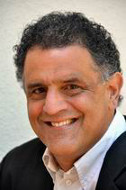
Vito S. Polito
Professor of Plant Sciences, Emeritus
Vito S. Polito was born on December 24, 1945, in Yonkers, New York. He graduated from Vacaville High School in 1963. After high school he attended UC Berkeley, majoring in engineering, but left UC Berkeley when he was drafted into the US Army. He served as an Army photographer from 1967 to 1969 at Ft. Sill, Oklahoma. After his Army service, he enrolled at Sonoma State University and completed his undergraduate Bachelor’s degree in Biology in 1973. In September, 1973, Vito enrolled in the Botany Graduate Group at UC Davis and received a PhD degree in Botany in February, 1979. One day after filing his PhD dissertation he accepted an appointment as an Assistant Professor at UC Davis. He initially had a joint academic appointment in the Departments of Pomology and Viticulture and Enology. After a couple of years, the appointment in Viticulture and Enology was dropped and he maintained a joint appointment in the Academic Senate and the Agricultural Experiment Station within the Department of Pomology until 2004 when his appointment was folded into the new Plant Sciences Department following the merger of the Departments of Pomology, Agronomy & Range Science, Environmental Horticulture, and Vegetable Crops.
Professor Polito’s initial botanical research was in studying cell division and development of apical meristems of plants but after accepting the position in the Pomology Department he quickly turned his attention to numerous research challenges concerning the reproductive biology of fruit and nut trees. This work encompassed multiple studies concerning several aspects of the reproductive biology of olive, almond, English walnut, pistachio, kiwifruit, peach, pear, cherry, prune and apple. Dr. Polito’s research career spanned the period during which significant advances in microscopy, most notably scanning electron microscopy, and in immunocytochemistry, became readily available, opening up new opportunities for new studies on the reproductive biology of these important crops. Many of his publications are seminal papers that have led to current-day understanding of the intricate details of flowering, pollen development, pollination and fruit development of important California tree crops. His research made significant contributions to basic and applied science by both increasing understanding of fundamental questions in botany and providing solutions to problems challenging California’s agricultural industries.
Some of the more important agricultural issues that Professor Polito’s research helped to elucidate and address were: pistillate flower abortion in English walnut, assessing preformed leaves in dormant walnut buds, the timing of flower bud differentiation in numerous Prunus (almonds and stone fruits) species, the processes and causes of fruit doubling in cherry, peach and nectarine, the negative effects of high bloom temperature on fruit set in prune, and the processes involved in pollen incompatibility among cultivars of almond. His research in all of these areas led to concrete recommendations for how farmers could manage for or mitigate the negative aspects of these phenomena. Vito was always ready to meet with growers or farm advisors to discuss issues related to the reproductive biology of pomological crops and often gave talks at grower meetings. He always gave clear presentations that were presented at a level appropriate for his audiences. Although perhaps underappreciated by some of his more fundamentally oriented scientific colleagues, it would be difficult to overstate the impact of his research to improving understanding of issues involving the reproductive biology of California’s pomological crops and the development of strategies to mitigate the effects of those problems on tree crop productivity.
Over his career Professor Polito taught numerous undergraduate and graduate courses related to his expertise in reproductive biology of crops and general pomology. He also mentored many of his own graduate students and graciously provided assistance to students of other professors who needed guidance with microscopic techniques and the use of the specialized microscopy equipment in his laboratory. He regularly hosted visiting students and U.S. and international scientists in his laboratory who came to UC Davis to study issues related to the reproductive biology of tree crops.
Dr. Polito also had an outstanding record of university service. He served on numerous committees at all levels of the University. Perhaps the most impactful was his service as the last Chair of the Department of Pomology from 2002 to 2004 before the department was subsumed into the newly formed Department of Plant Sciences at UC Davis. During this period Professor Polito took the lead in developing strategic and implementation plans to merge all of the academic and administrative activities of four academic departments (Pomology, Vegetable Crops, Environmental Horticulture and Agronomy and Range Science) into one highly functional and effective department comprising approximately eighty faculty members and nearly four hundred staff members and students. This was a daunting task because each of the four departments had their own operational norms and many faculty and staff members were not in favor of the merger. Professor Polito navigated this challenge with diplomacy and logic and the merger occurred with a minimum of academic strife. His numerous contributions in university service have had a lasting impact on the university.
Professor Vito S. Polito retired from the university in June 2013 and lived in Berkeley CA, until October, 2023. He is survived by his wife Esther, daughter Jessica, son Anthony and two grandchildren.
Theodore DeJong
Judy Jernstedt
Bruce Lampinen
Daniel Potter
